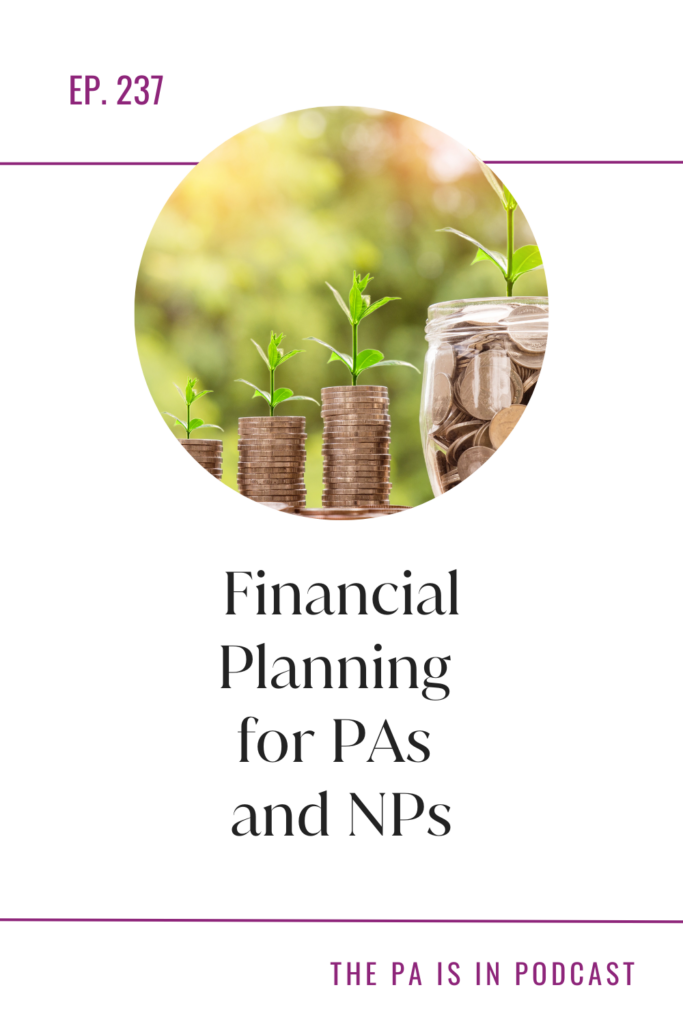
You’ve made it through PA school and are thriving as a badass PA taking care of complex patients with intricate medical needs. But when it comes to finances and financial planning, you feel overwhelmed and lost. You want to make sure you and your family are financially stable. You want to retire one day (maybe sooner rather than later). You want to achieve a myriad of goals that all require money. But how can you make that happen? How do you know if you’re on the right track?
Caleb Pepperday is a Certified Financial Planner (CFP®) and Chartered Financial Consultant (ChFC®) who specializes in helping PAs and NPs achieve their financial goals. Tune into today’s episode to hear Caleb tackle all of your money questions, from the difference between saving and investing to the FIRE movement to how a financial advisor can help you.
Caleb breaks down complex financial topics so you can understand them. His financial planning firm, Advanced Practice Planning, LLC, is designed to specifically help PAs and NPs. Press play so you can feel more confident on the next steps in your personal finance journey.
Listen to the Podcast: Apple Podcasts | Spotify | Google Podcasts
Watch on YouTube

Entering the Finance Industry
Caleb became a financial advisor because he saw a gap in the finance industry when it came to medical providers. Caleb’s brother is a physician and had access to many different financial planners. On the other hand, Caleb’s wife is a PA, and Caleb noticed there weren’t a lot of financial planners that focused on medical professionals like PAs and NPs. There also isn’t a lot of education on finances and investing while in school, so medical professionals are lacking knowledge on how to best utilize their high incomes.
Caleb founded Advance Practice Planning to specifically cater to PAs and NPs. He wants to make sure each of his clients understand their financial plans and how their plans will help them reach their goals.
Saving Versus Investing
Saving is the act of putting money in an account for short-term or mid-term goals. A savings account in your local bank or a high-yield savings account have relatively low interest rates compared to investment accounts. Investing, on the other hand, puts money to work in different investing vehicles for more long-term saving goals. Investing takes advantage of compound interest so your money can grow exponentially.
It’s important that your money is in the right type of account based on your goals. Short-term goals are best served with a savings account, but long-term goals require investing accounts to truly grow to the amount you need.
Don’t be the richest person in the cemetery. It’s important to have goals and a timeline for your money. What is your “use by” date for this particular bucket of money? It’s important to use and enjoy your money while you’re living.
Retirement Versus Financial Independence
The stereotypical definition of retirement is the age at which you can start collecting Social Security, which is typically 62-65 years old. For most retirement accounts like 401ks, 403bs, and IRAs, the earliest you can start accessing that money is 59 ½ years old.
For people with high incomes, like PAs and NPs, there is the opportunity to retire early. The FIRE movement is Financial Independence Retire Early. In discussing goals with his clients, Caleb asks what their plans are in retirement. What will you do all day? What does a typical day look like? Most people have not considered what they are retiring to, just what they are retiring from.
Caleb has found that many of his clients actually want FIRE to stand for Financial Independence Recreational Employment, where they can have control and purpose over what they’re doing on a daily basis. His clients may want to continue working in medicine but in a different specialty or have reduced hours, or they may want to work in a completely different field. But they want control over their time and how it’s utilized, regardless of which age they retire.
In financial independence, you are not reliant on your job to make money. Your money in your investments makes more money than you do at your job. But financial independence isn’t just about the money. Even more importantly, financial independence is about having choices, more time, and increased flexibility.
Non-Traditional Financial Planning
Traditional financial planning is focused on the goal of retirement only. However, many people now don’t only have the goal of retirement. Their goals can include time off when having children, taking sabbaticals from work, or starting their own businesses. PAs and NPs have a unique opportunity to focus on these more complex goals due to their earning potential and career potential.
For most medical professionals, our careers are not just a job, but our vocation. Medicine is our calling. Therefore, many medical professionals may want to continue working well into their 60s. However, due to burnout, aging parents, increased needs of children, etc., it can be necessary to make changes in employment, whether that’s cutting hours or not working for a season. Having financial padding and security can make these decisions much easier when you’re not handcuffed to a job for the paycheck. As a PA, we can stay licensed and up to date on our certifications even if we step back from work. The medical profession can also accommodate odd hours or shift work, which can help in making the adjustments needed to reach your goals.
The Personal Aspect of Personal Finance
Every person has their own individual goals. These goals can vary from building a house to having children to traveling the world. Caleb’s starting point when working with clients is to look at their end goals first. By clearly defining your specific individual goals, you first need to determine how much money you’ll need to have saved to achieve these goals. The next step is to determine what is needed on an ongoing basis to achieve your goals. These steps can include changing your hours, like working part-time versus full-time or picking up extra shifts. These steps can also include adjusting the percentage of your salary you are saving and investing so that you can achieve your end goals.
There is no “one size fits all” approach that works for everyone. It comes down to your personal situation and your season of life. Your goals can also change with time, which makes personal finance an ongoing process that requires adjustment. You can’t be on auto-pilot for 50 years. Caleb recommends people re-evaluate their retirement investments like a 401k only about 1-2 times per year after initially setting up your investment allocations. Because you don’t need the money for several decades, you won’t be making major changes to them, so you don’t need to check them as often. High-yield savings accounts or taxable brokerage accounts for short-term or mid-term goals should be evaluated more frequently.
Caleb recommends that people check their budgets most frequently compared to any other accounts. It’s important to know how much money you’re bringing in each month and then where that money is going, including savings and investing accounts, bills, and discretionary spending. Budgets should be checked on a weekly or biweekly basis to ensure that your money is being spent according to the plan you set for it.
Benefits of Working with a Financial Advisor
A financial advisor can help clarify your goals and coach you on how you can best reach them. An advisor can also help if you find yourself nervous with market fluctuations and explain how these fluctuations may or may not affect your accounts and your goals. An advisor can help you control your emotions and get out of your own head.
As clinicians, it can be very hard for us to be unemotional and objective when it’s our own family members with a medical problem. In this same way, it can be hard for us to be analytical and logical when it comes to our own money. It can therefore be very beneficial to have an advisor to talk you through the process and confirm if you are on your way to achieve your financial goals.
Personal finance can be easy in theory but difficult to implement in practice. An unbiased third party can be a great asset to confirm if your purchases are in line with your big picture goals. An advisor can help you make decisions that are in your best interest not only now, but also years in the future. It’s great to ensure that your future self will also benefit from your current self’s decisions.
How Financial Advisors Make Money
There are several ways financial advisors can earn money. One way is by receiving commissions from selling insurance or investment products.
A second way is by charging an asset-based amount that’s based on the client’s total amount of money invested. Advisors will charge a management fee, usually about 1%, to manage your investments. The management fee is the advisor’s compensation.
A third way financial advisors make money is by being a fee-only advisor that simply charges a flat hourly rate for the services provided. This can include ongoing monthly meetings to check on your investments and your financial plan or can be a one-time meeting to review your overall financial picture.
It’s important to pay for the services you actually need. You don’t want to pay for ongoing management or services you don’t utilize. Clients should look for clear and transparent pay models with an advisor that acts as a partner who can explain things clearly and comprehensively.
Caleb also recommends working with an advisor who is an expert in your field of work. For example, Caleb does not work with people in the tech industry because he does not have experience or knowledge regarding some of their complexities, like stock options and non-disclosure agreements. He does work specifically with medical professionals because he understands their specific needs.
Connect with Caleb
LinkedIn: https://www.linkedin.com/in/caleb-pepperday/
Twitter: https://twitter.com/CalebPepperday
Instagram: https://www.instagram.com/advancedpracticeplanningllc/
Website: https://www.advancedpracticeplanning.com/
Newsletter Sign-up: https://www.advancedpracticeplanning.com/financial-soap-notes
Other Posts and Videos You’ll Love
Episode 74: Your Framework for Financial Wellness Listen to the podcast | Read the blog

Episode 101: How to Manage Your Money Better & Become a Smart Money Mama with Chelsea Brennan Listen to the podcast | Watch on YouTube

Episode 129: 8 Ways to Have More Money: Listen to the podcast | Watch on YouTube | Read the blog

Episode 139: 5 Keys to Financial Independence: Listen to the podcast | Read the blog

Episode 141: 5 Accounts to Build Wealth: Listen to the podcast | Read the blog

Episode 168: Stop Making These Mistakes When It Comes to Financial Independence with Kristin Burton: Listen to the podcast | Watch on YouTube | Read the blog
